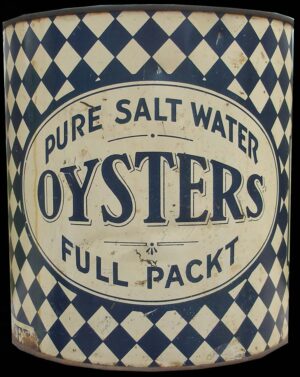
The facts of the case are mostly undisputed. The only question that remains unanswered is whether saloon owner J. W. Barton was intoxicated when he fired his gun at Joseph M. Garvin, missing his head “by the fraction of an inch.”
Joe was the proprietor of “Mendocino’s Cheap Cash Store,” a general merchandise establishment on Lansing Street, located where GoodLife Café & Bakery is today. Between 1902 and 1909, his store carried a wide variety of supplies, including groceries, clothing, housewares, hay, sewing machines, appliances, and even pianos.
In 1904, J. W. Barton purchased Gus Leighton’s saloon, located in the same block as Joe’s store, down on the northeast corner of Lansing and Ukiah Streets. Barton called his business “The Manila Saloon.”
An argument over the quality of oysters preceded the near-fatal gunshot. Barton entered Joe’s store on the evening of January 11, 1906 to complain about the oysters he had purchased from him earlier in the day. Then Barton started cursing and called Joe a liar. The discussion turned violent when Joe hurled a can of the oysters in question at Barton, striking him on the mouth, followed up in rapid succession by two more, whereupon Barton drew his gun and fired a single shot, barely missing Joe’s head.
At that point, Joe rushed from behind his counter, but Barton had already put his gun away. Barton later claimed that he had only intended to scare Joe, not kill him. The original Mendocino Beacon article describing this incident noted that Barton was “under the influence of liquor.”
The following afternoon, Joe Garvin visited Justice J. F. Murray at the Big River Justice Court in Mendocino to swear out a criminal complaint against Barton on a charge of assault with a deadly weapon.
Justice Murray held a preliminary examination of the charge behind closed doors the next week. By this time, the charge had increased to assault with intent to commit murder. Witnesses testified that “there were aggravations on both sides but not enough to justify the use of a pistol.” Murray bound Barton over for trial in the Superior Court in Ukiah under a bond of $2000.
The Beacon noted that the hearing failed to establish that Barton was under the influence during the shooting, as the newspaper had been told the week before. However, in a recap of the case 4 years later, the Beacon again claimed that Barton was intoxicated during the shooting.
The trial began in the Ukiah Superior Court on March 12, 1906, but Joe had changed his mind about prosecuting Barton and now refused to cooperate with the court. The trial went forward, with Barton pleading guilty. To Judge White, he “promised the best of conduct in the future if he was spared a prison sentence.” Barton was fined $100 (about $2,900 today) and released.
Perhaps this “oyster incident” had something to do with Barton leaving Mendocino, as we find him operating the Pacific Hotel in Caspar the next year. When liquor sales were banned in Mendocino and Caspar in 1909, Barton went right on selling alcohol, as many of the saloons and hotels did. Forgetting his promise to the judge of “the best of conduct,” he was back in court by December paying a steep fine for peddling illegal whiskey in a dry county.
A few years later, Joe Garvin retired from business, selling out to his clerk, Frank H. Bailey. However, it wasn’t long afterward that the Beacon reported Joe and his wife had not actually retired, but had found a new grocery venture down in Vallejo. Over the next few years, Joe returned often to visit his many friends in Mendocino and to purchase fresh huckleberries and other coast specialties to sell at his store in the city.